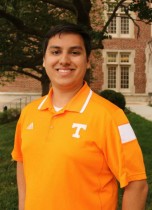 CEE student Nathan Kabir aspires to be an example of a STEM student who is active and involved across campus. This junior has already spent a year as an orientation leader welcoming students to the Big Orange family, and he just recently attended an SEC leadership conference where he learned from peers at other institutions about ways to contribute to the diversity and inclusion at UT. His application to be an Engineering Ambassador is pending, but he’s optimistic.
CEE student Nathan Kabir aspires to be an example of a STEM student who is active and involved across campus. This junior has already spent a year as an orientation leader welcoming students to the Big Orange family, and he just recently attended an SEC leadership conference where he learned from peers at other institutions about ways to contribute to the diversity and inclusion at UT. His application to be an Engineering Ambassador is pending, but he’s optimistic.
Why so much involvement when he could be spending more time studying? “I heard a quote that really made an impact on me,” he says. “It is ‘Be the person you needed to be there for you when you were younger.’” With this in mind, Kabir has been a friendly, welcoming face to new students who might feel intimidated on large campus. He’s helped them register for classes and led group discussions about struggles on campus with regard to issues of inclusion and diversity. “I want people to know that they can be in any major and find time to be involved and broaden their perspective,” he says.
Kabir is also very academically involved, and is currently working as a research assistant to Professor Shashi Nambisan to collect data for transportation engineering. Kabir collects seatbelt usage data in five counties in the Knoxville area in East Tennessee and Rutherford County in middle Tennessee. This is to identify people’s use of seat belts at night, typically between the hours of 9 p.m.-1 a.m., when seat belt usage rates are lower than during the day time.
The goal of the research, which is sponsored by the Centers for Disease Control, is to find effective strategies to increase seat belt usage rates. These include increased law enforcement, education and community outreach efforts through various media (billboard, TV, Radio, social media, etc.), and other programs. Later this year, Nathan will work on community outreach and education efforts about the importance of seat belt usage by going to high schools to talk to students and participating in community events.
“Nathan demonstrates a quest for learning that transcends traditional coursework, laboratory, and library activities,” says Dr. Nambisan. “He also shows an earnest desire to apply his knowledge, skills, and abilities to help others and an innate sense of when to lend a helping hand. I feel that these are critically important for understanding the wide-ranging societal implications of our research, and ultimately translating the outcomes of research into practice.”